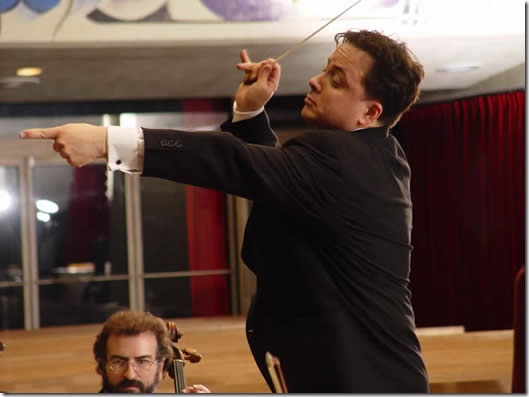Alexander Platt’s final concert over the weekend as the principal conductor of the Boca Raton Symphonia was a good example of the kind of event that has distinguished his three-year tenure: fresh programming, young, rising soloists, and an affection for canonical works that allows him to see well-established pieces with new eyes.
He’s been able to pass his sense of engagement on to his audiences and his charges at the Boca chamber orchestra, and the result has been some very fine, innovative music-making. New or neglected music, much of it American, has been his special focus, and past concerts have included violin concerti by Ned Rorem and Jonathan Leshnoff, a nocturne for harp and strings by Irving Fine, and this past Sunday afternoon at the Roberts Theater, a chamber concerto by Samuel Barber.
The centenary of Barber’s birth is being celebrated this year (the composer was born March 9, 1910), and he’s had a good week, with the Cello Concerto getting five performances across the state with the Detroit Symphony, and the Capricorn Concerto getting a hearing at the Symphonia. The orchestral soloists for this Brandenburg-style work were orchestra members Jeanne Tarrant (flute), Erika Yamada (oboe), and Jeffrey Kaye (trumpet).
The Capricorn Concerto (named after the New York house where Barber lived with his partner, Gian-Carlo Menotti) is the kind of neoclassical work that was very much in vogue in 1944, when it was written, and while it is recognizably Barber, it has some of the spikiness of the Stravinsky of Dumbarton Oaks or the Ebony Concerto. Platt has a good feel for the ear-cleaning directness of this style, and his soloists played with clarity and care, as well as an attractive fatness of tone.
Unfortunately, the violin contingent of the Symphonia was noticeably weaker than it has been on previous occasions, and as several people listed in the program were nowhere to be seen on stage, one has to assume that freelance duty called elsewhere. The upshot was that much of the string sound Sunday was thin and not terribly unified, and it was often insufficient to carry the dialogue between soloists and ensemble, particularly in the first movement.
It was also a problem in the opening work on the program, Barber’s Adagio for Strings, added to the program as a memorial to victims of the Jan. 12 Haitian earthquake, which claimed the lives of six students and professors from Lynn University. Platt clearly wanted a faster pace at the beginning of the piece than the strings wanted to give him, and there was some thematic dislocation and overlap for a few seconds until everything got back on track.
The Italian pianist Alessio Bax was the guest soloist Sunday in another celebratory work, the Concerto No. 2 (in F minor, Op. 11) of Frederic Chopin, born 200 years ago this year in small-town Poland. Bax is an expert pianist with a beautifully controlled, elegant sound that was well-suited for Chopin, and the composer’s Classical orientation in particular. None of the sparkling filigree posed any serious difficulties for Bax, and in the gorgeous second movement, he avoided dragging out his entrance, leaving the inherent beauty of the music to speak for itself.
Bax’s cool, polished approach was welcome, too, in the opening theme of the finale, which unfolded with suavity, though the faster major-key closing section was marred by a botched horn solo. It was a model performance, and Bax followed with an encore: The Prelude for the Left Hand (in C-sharp minor, Op. 9, No. 1) of Alexander Scriabin.
The Russian Scriabin was deeply influenced by Chopin, especially in early pieces (1894) such as this, and Bax gave it a lovely reading, playing with plenty of smooth legato despite using only one hand to do it, and he ended the prelude with a surpassingly tender, stretched-out major-key arpeggio.
The concert closed with the Paris Symphony (No. 31 in D, K. 297) of Mozart, the piece that marked the beginning of Platt’s association with this orchestra. At its best, this was an interpretation that had muscle, drive and shape, and did well by Mozart. But in the two outer movements of the three-movement work there were moments when ensemble simply wasn’t that good, particularly in the violins, and that detracted from the effect.
French pianist and conductor Philippe Entremont will take charge of the orchestra next season, and lead three of the five concerts. Platt will conduct one of the remainder, and veteran conductor and composer Gunther Schuller will lead the other.
Although Platt will return to the Boca Raton Symphonia each year for one guest appearance, he will be missed. It’s not often that a chamber orchestra has a conductor, musicians and an audience that are willing to take chances and hear a group explore, on a regular basis, more of the repertory than might be considered “safe.”
It says a lot about Alexander Platt’s intellectual curiosity that he is continually willing to advocate for music off the beaten track, and a lot about his gifts as a conductor that he was able to turn that interest, every time, into compelling afternoons at the symphony.
The final Boca Raton Symphonia concert will be led by guest conductor Scott Yoo, who will be joined by guitarist Jason Vieaux in the beloved Concierto de Aranjuez of the Spanish composer Joaquin Rodrigo. Also on the program is Aaron Copland’s early Music for the Theatre and Mendelssohn’s incidental music for Shakespeare’s A Midsummer Night’s Dream. The concert is set for 2:30 p.m. Sunday, March 21, in the Roberts Theater at St. Andrew’s School, Boca Raton. Tickets: $28-$49. Call 376-3848 or visit www.bocasymphonia.org.
